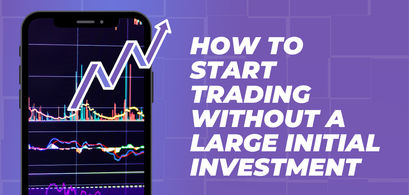Grasping the Core: Is Trading Possible with Minimal Funds?
The simple answer is, yes. With, let’s say, commission-free platforms, fractional shares, and leveraged products, it is easier than ever to trade. The biggest misconception, however, is that you need at the very least thousands of dollars to start. While more money at hand would permit more agility, a higher threshold is not an indispensable condition for success.
Here are a few points to consider before moving on:
Choosing Brokerage: Selecting a new broker can be difficult; try to ensure they offer low fees and don’t require a compulsory minimum deposit.
Investment Strategy: Strategies that are ideal for low funds, for example, swing trading or forex trading.
Money Management: Take caution to never spend more than you are willing to lose, and employ stop-loss orders.
Choosing the Right Market for Low-Capital Trading
Different markets have different capital requirements. Some markets allow you to start with as little as $10, while others may require a few hundred dollars.
Best Markets for Small Investors
Market | Initial Capital Needed | Pros | Cons |
|---|---|---|---|
$10 – $100 | High leverage, 24/5 trading | Can be risky if over-leveraged | |
$10 – $50 | Low barriers to entry | High volatility | |
Stocks (Fractional Shares) | $1 – $100 | Access to big companies | Not all brokers offer it |
Options | $50 – $200 | High return potential | Requires knowledge of contracts |
Each market has unique risks and rewards, so research carefully.
Trading Strategies That Work with Small Capital
You need a strategy that allows gradual growth without exposing you to excessive risks. Here are some effective trading approaches for small accounts:
Swing Trading
This involves holding trades for a few days to weeks, capturing medium-term price movements. It requires patience but works well for traders with limited capital.
Why it works:
You don’t need to monitor the market constantly.
You can use technical analysis to spot profitable setups.
Scalping
Copy Trading
Managing Risk with a Small Account
Since you’re working with limited funds, proper risk management is essential. Here’s how to protect your capital:
Use Stop-Loss Orders: Always set a stop-loss to limit potential losses.
Risk Only 1-2% Per Trade: This ensures you don’t wipe out your account in a few bad trades.
Diversify Trades: Avoid putting all your capital into one asset.
One mistake new traders make is overleveraging, especially in forex and crypto trading. While leverage can amplify gains, it can also wipe out your funds quickly.
How to Choose a Trading Platform for Small Capital

Selecting the right platform is crucial. Look for:
Low or no fees on trades
Fractional shares and micro-lots for forex
A user-friendly interface with educational tools
Using Free Educational Resources to Your Advantage
Knowledge is more valuable than capital in trading. Many beginners lose money due to a lack of education rather than insufficient funds. Fortunately, free educational materials are available.
Where to Learn Trading for Free
YouTube Channels: Many traders share step-by-step guides.
Demo Accounts: Most brokers offer practice accounts.
Trading Forums: Sites like Reddit provide valuable discussions.
Online Courses: Websites offer free trading tutorials.
While these resources are a great starting point, structured learning can provide deeper insights and a clearer path to success. Platforms like Witzel Trading offer courses that go beyond the basics, focusing on risk management and strategic decision-making. Markets never stay the same, so even experienced traders need to keep learning to stay ahead.
Starting Small: Growing Your Trading Account
The goal isn’t just to start trading but to grow your account over time. Here’s how to do it efficiently:
Reinvest Profits
Instead of withdrawing early gains, reinvest them to compound your returns.
Stick to a Trading Plan
Avoid impulsive trades and follow a structured plan.
Track Your Performance
Keep a trading journal to analyze what works and what doesn’t.
How to Avoid Common Mistakes When Trading with Small Capital
Each of your actions is of grave importance when there is a funding deficit. Beginner traders often find themselves in situations that could cost them most of their capital. Learning where they go wrong is vital in increasing one’s chances of success.
Overtrading
Beginners believe that higher trading volumes always lead to higher profits. Overtrading does much more negative than good as it increases costs, risks, and poorly made decisions. Day trading should be substituted with strategic trading that aims for better profits in fewer trades.
Ignoring Risk Management
Using Too Much Leverage
Trading without a Plan
Conclusion
You don’t need a large sum to start trading. With careful strategy selection, risk management, and the right platform, even a small initial investment can turn into meaningful growth. Focus on education, discipline, and consistency. Remember, trading isn’t about how much money you start with—it’s about how you manage it.

.jpg)
